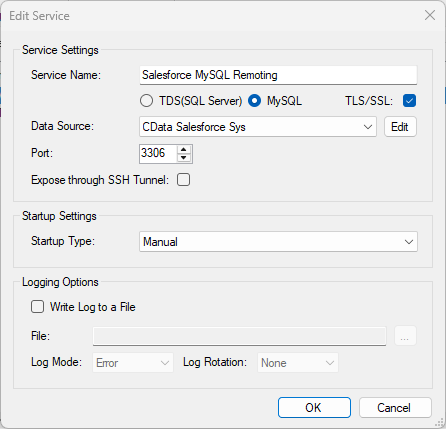Model Context Protocol (MCP) finally gives AI models a way to access the business data needed to make them really useful at work. CData MCP Servers have the depth and performance to make sure AI has access to all of the answers.
Try them now for free →How to create Dynamics CRM federated tables in MySQL
Use the SQL Gateway and the ODBC Driver to set up federated tables for Dynamics CRM data in MySQL .
You can use the SQL Gateway to configure a MySQL remoting service and set up federated tables for Dynamics CRM data. The service is a daemon process that provides a MySQL interface to the CData ODBC Driver for Dynamics CRM: After you have started the service, you can create a server and tables using the FEDERATED Storage Engine in MySQL. You can then work with Dynamics CRM data just as you would local MySQL tables.
Connect to Dynamics CRM Data
If you have not already done so, provide values for the required connection properties in the data source name (DSN). You can use the built-in Microsoft ODBC Data Source Administrator to configure the DSN. This is also the last step of the driver installation. See the "Getting Started" chapter in the help documentation for a guide to using the Microsoft ODBC Data Source Administrator to create and configure a DSN.
The connection string options meet the authentication and connection requirements of different Dynamics CRM instances. To connect to your instance, set the User and Password properties, under the Authentication section, to valid Dynamics CRM user credentials and set the Url to a valid Dynamics CRM server organization root. Additionally, set the CRMVersion property to 'CRM2011+' or 'CRMOnline'. IFD configurations are supported as well; set InternetFacingDeployment to true.
Additionally, you can provide the security token service (STS) or AD FS endpoint in the STSURL property. This value can be retrieved with the GetSTSUrl stored procedure. Office 365 users can connect to the default STS URL by simply setting CRMVersion.
Configure the SQL Gateway
See the SQL Gateway Overview to set up connectivity to Dynamics CRM data as a virtual MySQL database. You will configure a MySQL remoting service that listens for MySQL requests from clients. The service can be configured in the SQL Gateway UI.

Create a FEDERATED Server and Tables for Dynamics CRM Data
After you have configured and started the service, create a FEDERATED server to simplify the process of creating FEDERATED tables:
Create a FEDERATED Server
The following statement will create a FEDERATED server based on the ODBC Driver for Dynamics CRM. Note that the username and password of the FEDERATED server must match a user account you defined on the Users tab of the SQL Gateway.
CREATE SERVER fedDynamicsCRM FOREIGN DATA WRAPPER mysql OPTIONS (USER 'sql_gateway_user', PASSWORD 'sql_gateway_passwd', HOST 'sql_gateway_host', PORT ####, DATABASE 'CData DynamicsCRM Sys');
Create a FEDERATED Table
To create a FEDERATED table using our newly created server, use the CONNECTION keyword and pass the name of the FEDERATED server and the remote table (Account). Refer to the following template for the statement to create a FEDERATED table:
CREATE TABLE fed_account ( ..., firstname TYPE(LEN), numberofemployees TYPE(LEN), ..., ) ENGINE=FEDERATED DEFAULT CHARSET=latin1 CONNECTION='fedDynamicsCRM/account';
NOTE: The table schema for the FEDERATED table must match the remote table schema exactly. You can always connect directly to the MySQL remoting service using any MySQL client and run a SHOW CREATE TABLE query to get the table schema.
Execute Queries
You can now execute queries to the Dynamics CRM FEDERATED tables from any tool that can connect to MySQL, which is particularly useful if you need to JOIN data from a local table with data from Dynamics CRM. Refer to the following example:
SELECT fed_account.firstname, local_table.custom_field FROM local_table JOIN fed_account ON local_table.foreign_firstname = fed_account.firstname;

